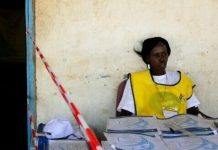Matia Samuel
Africa-Press – South-Sudan. The National Minister of Trade William Anyuon revealed that his ministry is rolling out comprehensive strategies in response to the country’s looming hunger.
Anyuon told the Transitional National Legislative Assembly on Tuesday that he has developed emergency food distribution plan with some procedures and methods to use as tools and means to ensure distribution.
“There are eight distribution zones within juba town, two zones on the eastern bank, six zones on the western bank and one zone for the various reachable states each zone is divided further into centres or registered shops for distribution,” Anyuon said.
He said, “Each zone is assigned to register the qualified centre and necessary arrangements are made prior to distributions to the approved centres.”
Anyuon noted that the concerned authorities and departments will assess the overall cost and establish appropriate prices for the items.
“The emergency food distribution team will on continuous basis conduct monitoring and evaluation during and after every supply is made to the centres,” he said.
Anyuon added that the ministry of trade and industry is closely monitoring the prices of essential commodities through price control and taking measures to stabilise them.
“This involved regulating the market to prevent price [increase] and ensuring that basic food items remain affordable for the population. By monitoring market trends and taking corrective actions, when necessary, the ministry aims to mitigate the impact of inflation on food price,” he stated.
According to him, the ministry took the proactive measures to address the issue of rising prices and ensure the availability of essential goods for its citizens.
“The strategies put in place focus on increasing food production, improving access to food supplies, and implementing social safety nets to support vulnerable populations. The ministry is working closely with relevant stakeholders to ensure the effective implementation of these strategies, prioritizing the urgent needs of the population while building long-term resilience against food insecurity,” he said.
Meanwhile, Nyayeng Johnson, a lawmaker from Jonglei State argued that Anyuon’s answers did not satisfy the questions posed by the lawmakers.
“I can say this without fear and contradiction that your ministry is not in control of the market at all. I was in Jonglei State once a month back where I went to market and buy soda, Coca-Cola in Jonglei State is SSP600 while in Juba here it is SSP1,500 and now has gone to SSP2,000,” she said as she questioned why traders in Juba were ironically charging more for their goods.
Source: The City Review South Sudan
For More News And Analysis About South-Sudan Follow Africa-Press






